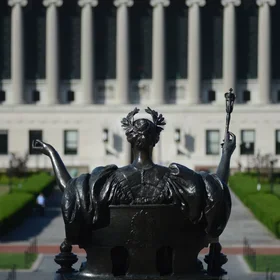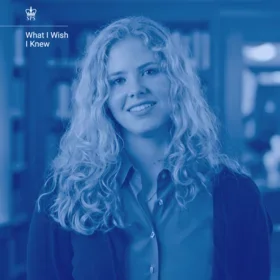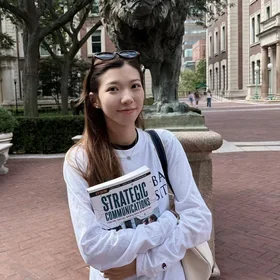Mik Pandit, a student in Columbia University’s Strategic Communication master’s program, is not the average student. A professional wrestler, lawyer and future communications professional, Mik has a unique background that prepared him for a career in the coming international expansion of the WWE. Throughout his diverse career, Mik tailored his experience to position himself at the intersection of in-ring wrestling, brand management and business affairs.
We sat down with Mik to discuss his unorthodox career path, the motivation behind his interesting life choices, the role of Columbia in his future plans and his career projections in a post-COVID world.
When did you start the Strategic Communication program and what drew you to it?
I am a professional wrestler, a professional athlete, and the thing about being a pro athlete is that at some point, it's going to end, and there are no exceptions to that rule. Most athletes have finished their athletic career by the time they’re 40, which is just about the halfway point in life. A lot of us struggle with what to do after our careers have ended, and we feel lost.
I wanted to be very clear about where I wanted to go once this part of my career has wrapped up, so that it'll be a seamless transition. I am curious about what the next phase of my life will be. I have completed law school—I was a practicing lawyer, while I was wrestling—but I didn’t want to continue on that path after seeing what it was all about.
WWE has rebranded itself very well over the past 10–15 years to a global media company that is pursuing a globalization-localization strategy and building a brand around the world. I thought I would like to become part of the branding side of things because, these days, it seems like people focus more on how they identify with a brand than they do on the actual product. That's what drew me to this program in fall 2019—I thought I might be in business or legal affairs, or even talent development within WWE in the future.
Tell me about your background. How did you become a professional wrestler?
I have been a big wrestling fan since I was a little kid. When I was a freshman at Rutgers University, I tried out for the basketball team. I came pretty close, but ultimately didn’t make the cut. I thought, “I don’t ever want to feel this way again. This is terrible.” But it sparked something in me—if you’ve ever played any sports, you know right away, it’s just an instinct—and I looked around for something else. I found The Monster Factory, a professional wrestling school outside of Philadelphia and was invited for a tryout, based on my sports and theater experience. I joined the school, and every weekend in college, I would take two trains and a bus to get there. I would train on Friday nights, crash on somebody’s couch, and train again the next day.
I started participating in the school’s shows, and then I slowly branched out to shows in and around the Northeast. Eventually, the WWE invited me to a tryout in Orlando, where they have their performance center. I competed with some Olympians, and the best of the best players. Almost all of the participants received rejection letters six weeks later, but I got an email that said, “We think there's something special here, but you're too young. You're just not ready yet. So, why don't we keep in touch every few months?”
Around that time, I finished law school and I was traveling around the country wrestling two or three times each weekend. My schedule was so full. Monday through Friday, I would be at the law firm. On Fridays, I would sometimes leave early in the afternoon to go to the airport. I’d fly from New York, land and wrestle on Friday night, then sleep and wake up at 4:00 a.m., only to go back to the airport to fly somewhere else for photo shoots, video recordings, interviews or podcasts, then wrestle again on Sunday, take a red-eye back to New York, rest and go back to work on Monday. And for a long time, my coworkers at the law firm didn't know that I was wrestling on the weekends.
It's not a normal life, but it's my story. I love it and I’m committed to it. I'm very happy.
How has the COVID-19 pandemic impacted you and your plans in the world of wrestling?
Last year, Canyon Ceman, the EVP at WWE actually called me and said, “Hey, listen, we are doing an international expansion and we need someone with a business background, but who can also get in the ring and perform, to oversee this.” Of course, I agreed—so last year, I began getting ready to be a part of this. And then the pandemic hit, so everything has been put on hold in terms of wrestling. But you know, there are ongoing conversations around preliminary talent development.
I'm also not really wrestling at all. In the past 14 years, this seven- to eight-month timeframe is the longest I've not wrestled in front of a live audience. I don't know when I'll be able to do it again. But because WWE is a media company and not a live event company, they still have their talent wrestling. They built something called the "Thunder Dome": they installed video cameras in the arenas, so people can dial into it and watch the fights like an audience. So that's kind of their adaptation to the pandemic.
What are your hopes for the future?
I have a unique background when it comes to WWE. I have legal experience, soon I’ll have a communications master's degree and I've put in about fourteen years on the talent side of things. From a business standpoint, when WWE is looking for people to lead their business affairs or talent development, they generally recruit people from the media or talent development industries, who have a peripheral understanding of what WWE is and how to handle talent relations.
Me, on the other hand, I have a great background in business, but I also have the talent experience. It’s like when a pro athlete decides to work at a sports agency. That gives me an advantage that other people don't have—I think I'm very well positioned to succeed with WWE and with other professional sports leagues or entertainment firms. I'm very happy with where I am now because for a long time, it felt like I was unsure of what direction I wanted to take. But it’s all coming together now. I'm hopeful for the future.
Are there any specific courses in the program that tangibly contributed to your professional endeavors?
One immediately comes to mind. Cheryl Dixon’s Communication and Global Brands course was very helpful for me—especially since WWE is a company that's expanding internationally quite aggressively. The course discussed how brands’ meanings domestically aren’t necessarily the same globally, and vice versa. It's all connected and you have to be able to tell a story that is inclusive of all the local brand stories, but differentiated enough for the specific regions.
I could relate to the course content because one of WWE’s endeavors right now is something called globalization localization. A lot of brands do this, where they have their overarching brand story, and then there are little tentacles that connect the stories they tell at a local level to the larger story. So, Cheryl's course was really helpful from that standpoint.
Do you have any last thoughts on your Columbia experience in general and highlights you would like to mention?
I think Columbia has done the best they can with adapting to the pandemic. I definitely wish classes were in person, but I think the school has been very good at pivoting and providing resources to make it more robust than the usual online learning. It's not the same as being in person, but I think they've tried hard to make it better, and I think they deserve a lot of credit for that. And that's something that I will remember—that the program tried to see how they can make the best of the situation and keep moving forward.
It sounds silly, but what I really miss is chatting with classmates during the five to ten minutes before class, the fifteen minutes after class or the walks to the subway.
Do you have any advice for future students who are coming to the program?
Just like in life, in this program, you're going to get what you put into it. The program is great—it's well-designed, and the faculty is world-class. But if you just cruise at it and don’t put enough effort into it, you won’t receive as good of a result. So you need to put the work in, and if you do, the return that you get from this program can be astronomical. It has been for me and I suspect it will be for people who share the same perspective.
Learn more about the M.S. in Strategic Communication.


